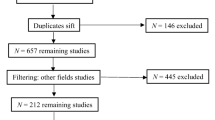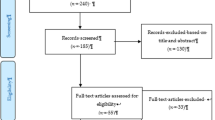Abstract
This study provides analysis of a representative national sample of Internet gamblers. Using participant data from the 2007 British Gambling Prevalence Survey (n = 9003 adults aged 16 years and over), all participants who had gambled online, bet online, and/or who had used a betting exchange in the last 12 months (6% of the total sample) were compared with all other gamblers who had not gambled via the Internet (62% of the sample). Results showed that Internet gambling and non-Internet gambling had a significant association with smoking (nicotine) and drinking (alcohol). Self-reported general health status was not significantly associated with Internet gambling but was significantly associated with offline gambling. Analysis of DSM-IV scores showed that problem gambling prevalence rate was significantly higher among Internet gamblers than non-Internet gamblers (5% versus 0.5%) and that Internet gamblers were significantly more likely to endorse individual DSM-IV items compared to non-Internet gamblers.
Similar content being viewed by others
Notes
The National Centre for Social Research (NatCen) is the largest independent social research institute in Britain. It designs, carries out and analyses research studies in the fields of social and public policy. It employs over 100 research staff who work on a wide range of social policy areas, including health, crime, education, employment, travel, social attitudes and families. NatCen is a not-for-profit company that conducts social research on behalf of a range of public bodies, including central government departments and agencies, universities, research councils, and charitable trusts and foundations.
This group of ‘non-Internet gamblers’ under an ‘umbrella heading’ is a very diverse group of people covering a wide range and the socio-demographics characteristics and activities.
The findings in this section may just be a function of sample size for offline gamblers being much larger. Therefore, these may not be real differences and could be an artefact of sample size.
References
Agresti, A. (1990). Categorical data analysis. New York: Wiley.
American Psychiatric Association. (1994). Diagnostic and statistical manual of mental disorders, 4th edition. Washington DC: American Psychiatric Association.
Broda, A., LaPlante, D. A., Nelson, S. E., LaBrie, R. A., Bosworth, L. B., & Shaffer, H. J. (2008). Virtual harm reduction efforts for Internet gambling: effects of deposit limits on actual Internet sports gambling behaviour. Harm Reduction Journal, 5, 27.
Gambling Commission. (2008). Survey data on remote gambling participation. Birmingham: Gambling Commission.
Griffiths, M. D. (2001). Internet gambling: preliminary results of the first UK prevalence study, Journal of Gambling Issues, 5. Retrieved 13 December 2008 from: http://www.camh.net/egambling/issue5/research/griffiths_article.html.
Griffiths, M. D., & Sutherland, I. (1998). Adolescent gambling and drug use. Journal of Community and Applied Social Psychology, 8, 423–427.
Griffiths, M. D., & Cooper, G. (2003). Online therapy: Implications for problem gamblers and clinicians. British Journal of Guidance and Counselling, 13, 113–135.
Griffiths, M. D., & Parke, J. (2007). Betting on the couch: a thematic analysis of Internet gambling using case studies. Social Psychological Review, 9(2), 29–36.
Griffiths, M. D., & Wood, R. T. A. (2007). Adolescent Internet gambling: preliminary results of a national survey. Education and Health, 25, 23–27.
Griffiths, M. D., & Barnes, A. (2008). Internet gambling: an online empirical study among student gamblers. International Journal of Mental Health and Addiction, 6, 194–204.
Griffiths, M. D., Parke, J., & Wood, R. T. A. (2002). Excessive gambling and substance abuse: is there a relationship? Journal of Substance Use, 7, 187–190.
Griffiths, M. D., Parke, J., Wood, R. T. A. & Rigbye, J. (2009a). Online poker gambling in university students: Further findings from an online survey. International Journal of Mental Health and Addiction. doi:10.1007/s11469-009-9203-7.
Griffiths, M. D., Wardle, J., Orford, J., Sproston, K., & Erens, B. (2009b). Socio-demographic correlates of internet gambling: findings from the 2007 British Gambling Prevalence Survey. CyberPsychology and Behavior, 12, 199–202.
Griffiths, M. D., Wood, R.T.A. & Parke, J. (2009c). Social responsibility tools in online gambling: A survey of attitudes and behaviour among Internet gamblers. CyberPsychology and Behavior, 12, 413–421.
Ialomiteanu, A., & Adlaf, E. (2001). Internet gambling among Ontario adults. Electronic Journal of Gambling Issues, 5, Retrieved 13 December 2008 from: http://www.camh.net/egambling/issue5/research/ialomiteanu_adlaf_articale.html.
International Gaming Research Unit (2007). An exploratory investigation into the attitudes and behaviours of internet casino and poker players (Global Online Gambling Report). Report for e-Commerce and Online Gaming Regulation and Assurance.
Jacobs, D. F. (1985). A general theory of addictions: a new theoretical model. Journal of Gambling Behavior, 1, 15–31.
LaBrie, R. A., LaPlante, D. A., Nelson, S. E., Schumann, A., & Shaffer, H. J. (2007). Assessing the playing field: a prospective longitudinal study of internet sports gambling behavior. Journal of Gambling Studies, 23, 347–363.
LaBrie, R. A., Kaplan, S., LaPlante, D. A., Nelson, S. E., & Shaffer, H. J. (2008). Inside the virtual casino: A prospective longitudinal study of Internet casino gambling. European Journal of Public Health, doi:10.1093/eurpub/ckn021.
Ladd, G. T., & Petry, N. M. (2002). Disordered gambling among university-based medical and dental patients: a focus on internet gambling. Psychology of Addictive Behaviours, 16, 76–79.
Matthews, N., Farnsworth, W. F., & Griffiths, M. D. (2009). A pilot study of problem gambling among student online gamblers: Mood states as predictors of problematic behaviour. CyberPsychology & Behavior. doi:10.1089/cpb.2009.0050.
MORI/International Gaming Research Unit. (2006). Under 16 s and the national lottery. London: National Lottery Commission.
Petry, N. M., Stinson, F. S., & Grant, B. F. (2005). Comorbidity of DSM-IV pathological gambling and other psychiatric disorders: results from the National Epidemiologic Survey on Alcohol and Related Conditions. Journal of Clinical Psychiatry, 66, 564–574.
Polit, D. (1996). Data analysis and statistics for nursing research. Stamford, Connecticut: Appleton & Lange.
Sevigny, S., Cloutier, M., Pelletier, M., & Ladouceur, R. (2005). Internet gambling: misleading payout rates during the “demo” period. Computers In Human Behavior, 21, 153–158.
Smeaton, M., & Griffiths, M. D. (2004). Internet gambling and social responsibility: an exploratory study. CyberPsychology and Behavior, 7, 49–57.
Sproston, K., Erens, B., & Orford, J. (2000). Gambling behaviour in britain, results from the British gambling prevalence survey. London: National Centre for Social Research.
Teeson, M., Degenhardt, L., & Hall, W. (2002). Addictions. Hove: Psychology.
Wardle, H., Sproston, K., Orford, J., Erens, B., Griffiths, M. D., Constantine, R., et al. (2007). The Briish gambling prevalence survey 2007. London: The Stationery Office.
Wood, R. T. A., & Griffiths, M. D. (2008). Why Swedish people play online poker and factors that can increase or decrease trust in poker websites: a qualitative investigation. Journal of Gambling Issues, 21, 80–97.
Wood, R. T. A., & Williams, R. J. (2007). Problem gambling on the internet: implications for internet gambling policy in North America. New Media & Society, 9, 520–542.
Wood, R. T. A., Griffiths, M. D., & Parke, J. (2007). The acquisition, development, and maintenance of online poker playing in a student sample. CyberPsychology and Behavior, 10, 354–361.
Author information
Authors and Affiliations
Corresponding author
Additional information
This study was funded by the Gambling Commission
Rights and permissions
About this article
Cite this article
Griffiths, M., Wardle, H., Orford, J. et al. Internet Gambling, Health, Smoking and Alcohol Use: Findings from the 2007 British Gambling Prevalence Survey. Int J Ment Health Addiction 9, 1–11 (2011). https://doi.org/10.1007/s11469-009-9246-9
Received:
Accepted:
Published:
Issue Date:
DOI: https://doi.org/10.1007/s11469-009-9246-9




